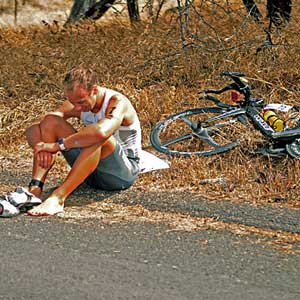Insurance for your bicycle?

The immediate question is, why? Don’t we all have insurance for our bicycles through our own homeowners or renters policies? Yes, we do. So, why double up through buying a policy just for a bicycle?
First, some bike insurance policies now available cover more than simply theft or loss through a catastrophe, such as a home fire. Velosurance, one of the new entres into the market, offers coverage when you crash your bicycle. This policy also covers if your crash occurs in a race, and this coverage extends even to the fee paid to enter the race, as well paying for your apparel if you road-rashed right through your skinsuit.
Velosurance also pays if your frame fails. “That’s also redundant coverage,” you might say. “That’s covered under the frame’s warranty.” Well, maybe. But what happens if you yank the dropout off your frame due to a chain suck? Lots of tri frames do not have replaceable dropouts. Your bike maker isn’t going to cover that. Further, Velosurance covers your bike whether or not you’re the original owner.
Why am I writing about Velosurance? Aren’t there other players? A few. There is a forum thread right now — as I write this — about a policy written by a company called Markel. How do these policies compare? They are identical. Markel is an insurance carrier. Velosurance is a general agent that writes Markel's policies. In a way it’s like buying directly from the manufacturer versus from a retailer. But at the same price.
Let's get back to the question of redundant coverages. Isn't your auto policy covering against these losses? it’s almost certain that your car insurance is not going to cover you if you crash on your bike, even if you crash into your own car, even if you drive into your garage with your bike riding atop, and probably even if your bike is stolen out of your car. Incredibly, Jordan Rapp had a lot of his voluminous medical bills paid during his life-threatening crash with a vehicle through his auto policy’s medical payments, even though he was riding his bike at the time. But I wouldn’t put too much reliance on your auto policy’s coverage in the case of a cycling accident or theft.
The argument in favor of bike insurance goes beyond what’s listed above. In the case of this writer, I’m insured by Farmer’s, for 2 homes, 5 vehicles, some other vehicles (quads, trailers, campers) along with an umbrella policy. It would be a hardship were I to be canceled, because the Xantusia “compound” familiar to a lot of Slowtwitchers sits in the middle of a wildfire area. Therefore, it’s hard to get insurance. I use my homeowners policy never, except in such case that I suffer a true catastrophic loss, and a bicycle does not qualify. Ergo, if I’m not ever going to claim that loss, I effectively have no bicycle coverage except if the entire compound burns to the ground and all my bicycles with it.
One of my initial questions was about the heirarchy of policies. This bicycle policy offers coverage for the loss of the bicycle along with optional medical payments. I crashed in a bike race 3 years ago, and “invoked” my USA Cycling medical payments coverage. Just over $200 was paid by this policy, out of many thousands in bills for surgery to put together a collarbone (using a titanium plate that, if it’s ever removed, would work perfectly as a bike tire lever). The scheme of using bicycle insurance in place of homeowners coverage, or as an adjunct to a medical insurance plan, falls apart if this policy sits secondary to other policies. However, in the case of both the Velosurance and Markel policy the coverage is treated as primary, and no other coverage is invoked for a bicycle or a medical payments loss.
Other potential hiccups: is this a replacement cost policy? Or an actual cash value policy? Actual cash value refers to the value of the product at the time of the loss. So, if you own a Cervelo P3, and it’s 6 years old, and you introduce it to the front wall of your garage just above the garage door because you forgot what was sitting up there atop your car, does the policy reimburse you for what you would have gotten had you sold your P3 on the Slowtwitch classified forum? That’s actual cash value. Replacement coverage is the reimbursement you get when you’re paid the requisite amount to buy a new P3. This is the basis for almost everybody’s homeowners insurance, and Velosurance works this way, on a replacement cost basis.
As noted earlier, leveraging the USA Cycling coverage was worth more trouble than it generated in benefits, because of the time it took to file a claim, and because it considered its own coverage secondary, and considered my medical plan’s deductible its deductible. This hurt, because I have a high-deductible Blue Cross plan. So, of the $3000 or so I incur if I max out my annual out-of pocket, the USA Cycling plan did not cover much of any of it.
As noted, the Velosurance/Markel plan considers medical payments to be primary. You can buy medical payments coverage in small blocs, and one tactic is to simply buy a bloc equal to your medical insurance annual out-of-pocket. In the case of one insured who purchased a face value of $2,500 in medical payments, his annual premium is $38. This face value is equal to the insured’s out-of-pocket.
Of course, the coverage follows the bike, so, theoretically, if he crashed on his MTB but he only covers his tri bike, coverage would not be afforded. If you want medical payments, you must buy this on all bikes you insure. In fact, if you insure multiple bikes, you must buy medical payments on all bikes if you want medical payments at all. That’s the only way this policy works. However, the insurer understands that you can only ride one bike at a time, so the medical payments coverage scales down as the number of bikes on a policy increases. We took a test case, and asked for $1000 of medical insurance. If the policy contains 1 bike only, the medical payments premium is $32. For 2 bikes, the coverage cost is $44. For 3 bikes, the total medical premium is $51. So, the medical payments premium scales down to $17 per bike in this case, if 3 bikes are on the policy.
Now, let’s say I wish to cover all the bikes in my household, including my wife’s bikes, and I want medical payments on all bikes. Let’s say that the wife and I both crash, we both incur medical bills. Will the medical payment coverage extend to cover us both? The answer is yes. The policy asks for specific riders to be assigned to bikes, and you may assign multiple riders to multiple bikes via the policy application. This seems to me to argue for one application for the entire set of bike in the family, rather than a policy for the wife and a separate policy for me.
One caution, however: Velosurance states that the coverage follows the bike in terms of physical damage or theft, but medical payments coverage does not follow the bike. Medical payments coverage is sticky, per assigned rider. So, my wife’s bike is covered if she loans it to her friend and her friend crashes it, but if my wife’s friend is injured in the crash, she is not covered by the policy’s medical payments.
The scalable nature of the medical payments flows to the bikes themselves. A policy written in the state of Georgia with a face value of $4000 (a bike that is insured to a maximum loss of $4000) would cost $298, not including the premium for medical payments and roadside assistance. But that rider's second insured bike on the policy is cheaper, and the third bike cheaper yet.
Roadside assistance is $10 a year, no deductible is applied, and you may invoke this 5 times in the course of a policy year. Your bike does not need to suffer a covered loss. You break a chain, you run out of tubes, heck, you run out of gels and can't make it home, you call the 800 number. Nice feature.
What is the cheapest way to buy bike insurance? First, you’ll receive a 10 percent discount on your Markel or Velosurance policy if you are either a USA Cycling or USA Triathlon annual member.
Both Velosurance and Markel offer, basically, the same policy, for the same price. It’s like buying a wetsuit directly from a manufacturer, versus buying it from Trisports.com or Nytro, or your local LBS. What you get from that retailers is an extra layer of service. In the case of insurance, it’s a little more complicated, and the need for that extra layer, when forming and processing a claim, can be handy. In the case of an insurance agent, that agent represents you, not the insurance company. It’s your advocate. Accordingly, that can be of value, especially if you’re not 100 percent sure how you should be answering claims questions.
On the other hand, Velosurance is not admitted to do business in every state. If you live in AK, ME, ND, SD, MT, DE, NV, WY, DC, KS, VT, NH, HI, & WV, Velosurance is not an option. But Markel is.


